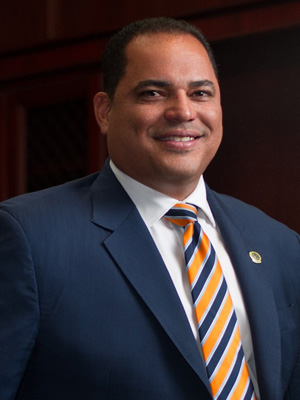2021-15
Updated Policies to Promote Peer-to-Peer Car Sharing and End Racial and Ethnic Disparities in Vehicle Ownership Costs

Sen. Carmelo Ríos Santiago (PR), sponsor
Sponsored by Sen. Carmelo Ríos Santiago (PR)
Reported to the Caucus by the NHCSL Business, Economic Development, International Relations and Trade Task Force
Rep. Juan Candelaria (CT), NHCSL VP for Policy, Acting Chair
Ratified by the Caucus on March 26, 2022
WHEREAS, a study on Equity and Smart Mobility developed by the Institute for Sustainable Communities (ISC) and the Center for Transportation Technology (CTT) reveals that, on average, minority households across the study area spend a higher percent of their income for transportation when compared to white households;[1] and,
WHEREAS, aside from student loans, rent and mortgages, auto purchases are the largest payments many Americans make;[2] and,
WHEREAS, Latinos have reported that the cost of car ownership and repairs resulted in foregoing the purchase of other necessities including food and healthcare;[3] and,
WHEREAS, Americans have around $1.38 trillion in outstanding auto loans in 2021;[4] and,
WHEREAS, vehicle insurance expenditures have increased since 2015 and Hispanics spend 26% more than non-Hispanic whites to insure a vehicle;[5] and,
WHEREAS, 90 percent of white households, 73 percent of African-American households, and 83 percent of Hispanic households own at least one motor vehicle, with white households owning 2.0 vehicles on average, African-American households owning 1.2 vehicles, and Hispanic households own 1.7 vehicles;[6] and,
WHEREAS, vehicles are inefficiently used and sit parked 95% of the time;[7] and,
WHEREAS, low-income families sharing their car on a peer-to-peer car sharing program can increase their household income by 6% and cash flow upwards of 8%;[8] and,
WHEREAS, the financial benefits of peer-to-peer car sharing flow heavily to higher-density neighborhoods with above-average unemployment and rental housing rates, as well as communities with greater shares of minority residents;[9] and,
WHEREAS, the sharing economy can contribute significantly to local economic growth because sharing economy suppliers and users are spending within the local economy and can have multiplier effects on job creation, entrepreneurship, and general economic health;[10] and,
WHEREAS, for individuals who cannot afford or choose not to own a car, peer-to-peer car sharing creates additional, locally enabled mobility options in neighborhoods that are not served by traditional car-sharing organizations.[11]
THEREFORE, BE IT RESOLVED, that the National Hispanic Caucus State Legislators (NHCSL) recognizes the economic opportunities generated by peer-to-peer car sharing in in helping to offset the disproportionately high cost of car ownership for Hispanics and people of color, in providing more mobility options for users in certain disadvantaged communities, and in reducing certain circumstances that force persons to buy vehicles for little use; and,
BE IT FURTHER RESOLVED, that the National Hispanic Caucus of State Legislators calls on state legislatures and the Federal government to enact legislation, including insurance legislation, that supports and enables individuals to participate in peer-to-peer car sharing; and,
BE IT FINALLY RESOLVED, that National Hispanic Caucus of State Legislators calls on state insurance regulators, legislatures and the Federal government to further investigate and end the insurance premium disparities and other cost-of-ownership disparities among racial and ethnic groups.
THE NATIONAL HISPANIC CAUCUS OF STATE LEGISLATORS UNANIMOUSLY RATIFIED THIS RESOLUTION, AS AMENDED, ON MARCH 26, 2022, AT ITS ANNUAL MEETING IN WASHINGTON, DC.
[1] See Institute for Sustainable Communities (ISC) and the Center for Transportation Technology (CNT), “Equity and Smart Mobility”. https://www.cnt.org/sites/default/files/publications/Equity-and-Smart-Mobility-Report.pdf
[2] See Ben Wick, Business Insider, “People have stopped paying their car loans and it shows millions are struggling in this economy”, April 5, 2021. https://www.businessinsider.com/economic-recovery-subprime-borrowers-car-loans-delinquent-uneven-debt-coronavirus-2021-4
[3] See Elizabeth Williams, Transportation Research Board, “Transportation Dilemmas Facing Low-Income Latinos in Massachusetts.” https://trid.trb.org/view/1287308
[4] See Federal Reserve Bank of New York, “Household Debt and Credit Report Q1 2021”. https://www.newyorkfed.org/microeconomics/hhdc.html
[5] Blacks spend twice as much as whites. See Consumer Federation of America, “Consumer Expenditure Survey Data Reveal Disparate Racial Impacts Related to Auto Insurance”. https://consumerfed.org/wp-content/uploads/2017/06/Auto-Insurance-Disparate-Racial-Impacts_Report.pdf. See also National Association of Insurance Commissioners (NAIC), 2018 – 2019 Auto Insurance Database Report.-- This footnote has been updated.
[6] Consumerfed, supra, n 5.
[7] See David Z. Morris, “Today’s Cars Are Parked 95% of the Time”, https://fortune.com/2016/03/13/cars-parked-95-percent-of-time
[8] See Joseph P, Schwieterman and C. Scott Smith, “An Engine for Earning, Estimating the Financial Benefits of Peer-to-Peer Carsharing to Vehicle Hosts”, April 2, 2019.
[9] Ibid.
[10] See Business of a Better World, “An Inclusive Sharing Economy, Unlocking Business Opportunities to Support Low-Income and Underserved Communities”, https://www.bsr.org/reports/BSR_An_Inclusive_Sharing_Economy.pdf
[11] A traditional car-share organization is one that maintains a fleet of vehicles for shared use and may include some privately owned vehicles; members pay for usage. Car owners earn a portion of the proceeds for sharing their vehicle with other carshare members. See CarShare Vermont, “Peer-to-Peer CarSharing”, https://studiesandreports.ccrpcvt.org/wp-content/uploads/2017/01/Peer_to_Peer_Final_Report_June2014.pdf

